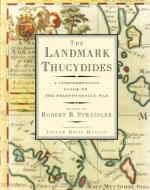|
This section contains 1,173 words (approx. 4 pages at 300 words per page) |

|
Thucydides' Historical Method
Summary: In Thucydides's writings about the Peloponnesian War and the Lacedaemonian kings, he is critical of the thought processes of many of his fellow Greeks. He writes that they indescriminately accept the history they are told, with no attempt to challenge the stories to see if they are accurate.
Thucydides indicates that people are indiscriminate about the stories or accounts they are told. They do not put them to the test. This is the case even with accounts that deal with their own country. Thucydides uses the example of the murder of Hipparchus. The Athenians believe that Hipparchus was a tyrant and was the ruler when he was killed by Harmodius and Aristogeiton. The fact of the matter is, Thucydides says, that it was Hipparchus older brother Hippias who was in power, not Hipparchus. Hippias was the eldest son of Pisistratus, so he was the ruler of Athens, not Hippias, who was younger, and not Thessalus, the third son of Pisistratus, who was also younger than Hippias. As for Harmodius and Aristogeiton, they originally planned to assassinate Hippias. However, somehow Hippias found out about their plot. Knowing that they would soon be arrested, Harmodius and Aristogeiton steered...
|
This section contains 1,173 words (approx. 4 pages at 300 words per page) |

|


